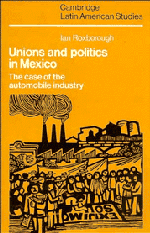Book contents
- Frontmatter
- Contents
- List of tables
- List of figures
- Acknowledgements
- Dedication
- Preface
- List of abbreviations
- Map: Location of automobile plants
- 1 Organized labour in Mexico
- 2 The Mexican automobile industry
- 3 Wages and workers in the Mexican automobile industry
- 4 The unions: a historical analysis
- 5 The unions: power and organization
- 6 Control over work processes
- 7 Union government
- 8 The labour courts
- 9 The empirical findings and the dynamics of industrial militancy
- 10 Unions and political stability in Mexico
- Notes
- Bibliography
- Index
- CAMBRIDGE LATIN AMERICAN STUDIES
3 - Wages and workers in the Mexican automobile industry
Published online by Cambridge University Press: 04 August 2010
- Frontmatter
- Contents
- List of tables
- List of figures
- Acknowledgements
- Dedication
- Preface
- List of abbreviations
- Map: Location of automobile plants
- 1 Organized labour in Mexico
- 2 The Mexican automobile industry
- 3 Wages and workers in the Mexican automobile industry
- 4 The unions: a historical analysis
- 5 The unions: power and organization
- 6 Control over work processes
- 7 Union government
- 8 The labour courts
- 9 The empirical findings and the dynamics of industrial militancy
- 10 Unions and political stability in Mexico
- Notes
- Bibliography
- Index
- CAMBRIDGE LATIN AMERICAN STUDIES
Summary
This chapter looks in detail at wages in the Mexican auto industry, and examines the hypothesis that rates of increase in wages are correlated with union militancy. There then follows a description of the social background of workers in the auto industry and a discussion of the utility or otherwise of describing these workers as an ‘aristocracy of labour’.
Wages
The principal interest in examining differences in wages among the various auto companies is to see if there is any relationship between union militancy and wage gains. The hypothesis is that there is a positive relationship, and it is argued that such wage gains are a direct result of union militancy. For a variety of methodological reasons the argument is somewhat complex. There are three principal sources of difficulty. The first is incomplete data. It was exceedingly difficult to obtain complete and comparable time series for all the companies. As a result, a number of partial comparisons have had to be made, and inferences drawn therefrom. Secondly, and relatedly, we are not interested primarily in comparisons at one point in time. Wages do differ between companies, and this reflects, among other things, the different local labour markets. It is not surprising that money wages are lower in the towns outside Mexico City. What is of more interest is the rate of growth of wages over time: i.e. do the more militant unions obtain higher percentage wage hikes, irrespective of the varying starting points?
- Type
- Chapter
- Information
- Unions and Politics in MexicoThe Case of the Automobile Industry, pp. 50 - 74Publisher: Cambridge University PressPrint publication year: 1984



